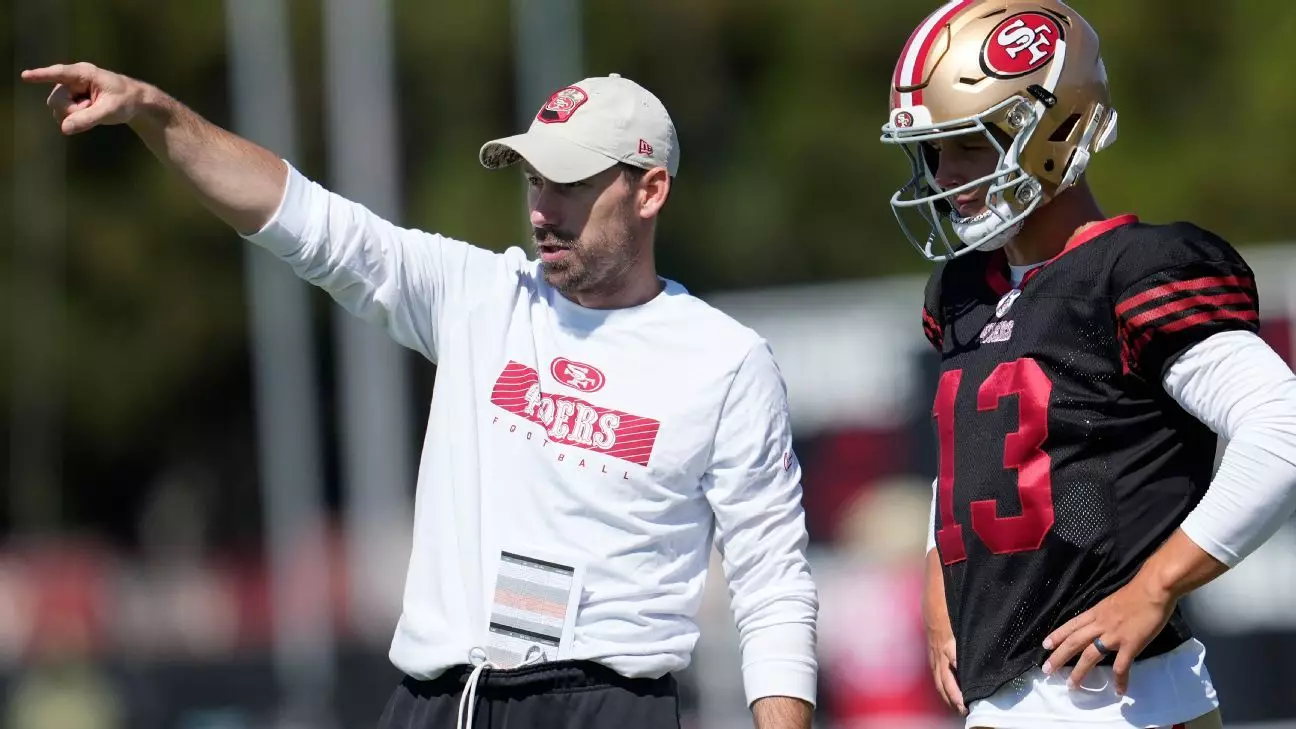The San Francisco 49ers have taken significant steps in reshaping their coaching staff following a disappointing 2024 NFL season. Head coach Kyle Shanahan, recognizing the necessity for fresh strategies and perspectives, has implemented a series of changes that aim to reinvigorate the team’s performance. The latest announcements signal a commitment to evolution—one that could potentially redefine the 49ers’ trajectory as they prepare for the 2025 season.
One of the most notable changes is Klay Kubiak’s promotion to offensive coordinator. This decision comes on the heels of his dynamic contributions over the past few seasons, during which he significantly impacted the team’s offensive strategies, albeit without the formal title. Kubiak joined the team in 2021 and has progressively climbed the ranks, serving as the offensive passing game specialist and assistant quarterback coach. Shanahan’s endorsement of Kubiak—highlighting his talent and the importance of his prior work—suggests that the organization is placing a degree of faith in him to enhance the offensive unit.
While Shanahan continues as the playcaller, there is an apparent collaborative dynamic emerging. By giving Kubiak this title, the team is acknowledging and formalizing the effectiveness he has already brought to the field. It indicates a gradual shift in responsibilities and possibly foreshadows a more cohesive offensive strategy going forward. Shanahan’s words about Kubiak’s growth and abilities underline a broader intent to ensure the offensive framework remains robust as they strategize for a return to glory.
As part of this coaching overhaul, several significant transitions have occurred, especially within the quarterback coaching role previously held by Brian Griese. His departure sets the stage for Mick Lombardi to take his place, having been brought on board as a senior offensive assistant. Reports suggest that Griese’s choice to step away was personally motivated, thus allowing Lombardi to inject fresh ideas and an updated approach to quarterback development—a crucial element for the team as they look to solidify their position.
In conjunction with the changes on the offensive side, the 49ers have bolstered their defensive coaching staff by bringing veteran coach Gus Bradley into the mix. His extensive history, spanning over a decade as a defensive coordinator and a former head coach, indicates a valuable infusion of experience. This move is particularly strategic—as coach Robert Saleh, the newly appointed defensive coordinator, will benefit from Bradley’s insights and tactics, potentially elevating the entire defense’s performance level.
The 49ers have also made strides in integrating younger talent and diversifying their coaching roles. John Lynch’s son, Jake Lynch, joins the staff as a defensive quality control coach, embodying a trend toward younger coaches becoming integral parts of NFL teams. This approach not only aids in scouting and teaching new techniques but also sparks fresh ideas from coaches who may resonate more with the modern player demographic.
To complement these hires, other notable additions include Colt Anderson as assistant special teams coach, and Ray Brown, who brings experience to the defensive backs section. Their integration into the coaching framework signifies the 49ers’ intention to build a cohesive unit capable of performing at high levels across all facets of the game. It reflects a thorough assessment of staff strengths and a determination to bolster problem areas.
Overall, the restructuring of the coaching staff signifies the 49ers’ serious commitment to improvement. Kyle Shanahan’s vision for the team relies heavily on a combination of seasoned expertise and innovative thinking. The promotion of Klay Kubiak, alongside the enlistment of veteran coaches like Gus Bradley, showcases a balanced approach toward developing a competitive edge while retaining the core philosophies that have defined the 49ers’ identity.
As the team gears up for the 2025 season, the emphasis on leveraging experience and fostering leadership within the coaching ranks could yield substantial results. With an adaptive strategy in place, the San Francisco 49ers appear poised to navigate the challenges ahead with renewed vigor and ambition, paving the way for a brighter future on the gridiron.

